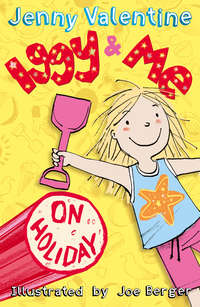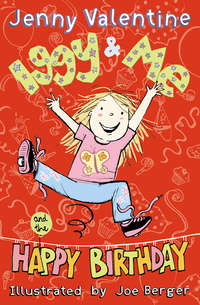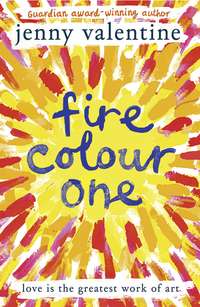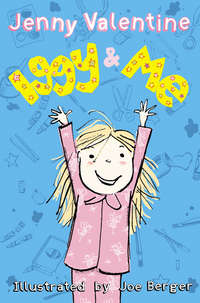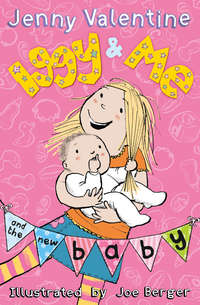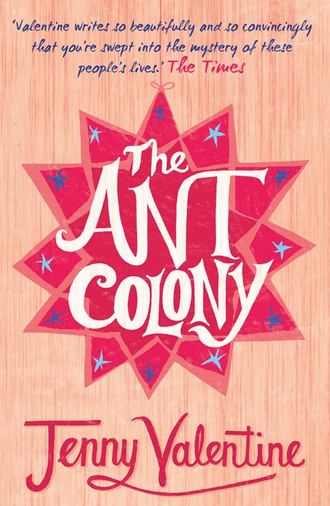
Полная версия
The Ant Colony
It was fine with me. I like being in a new place because there’s loads to do and look at and think about, and it takes longer than normal to mind being on your own. Mum gave me a pound for some chips if I got hungry and she said she wouldn’t be long. I put the money in my pocket and I made the sofa into a bed for later. I unpacked my clothes and made two really neat piles of them under the window. Then I played snake on Mum’s phone and made a few calls – not real ones because if she ran out of money I’d be in for it, and anyway, who would I speak to? I pretended to be like her when she’s on it, talking really quiet and biting her nails and saying things like “No way” and “ten minutes” and “you out tonight or what?”
Before she left I showed her the card I made for the front door. She liked it. She said she’d take it with her and put it by our bell. Maybe nobody would notice. But at least it showed we were alive in there.
Three (Sam)
It happened faster than I’d thought, my new life getting started. First I found a job, stacking shelves in an all night sort of supermarket. I only went in for a carton of milk. From the shelves I stacked most, I’d say most people went in for SuperTenants and five-litre bottles of cider. The hours were strange and peopled with drunks. I kept my head down. Nobody asked me any awkward questions and they didn’t need any paperwork, and they were as content as I was not to bother being friends.
And I found somewhere to live.
My place at number 33 Georgiana Street was the third bell of five. All the other bells had a name on apart from mine, and no name suited me fine. I found it outside a newsagent’s on a notice board. A guy came out while I was standing there and stuck a postcard on with a pin. I watched him walk back in the shop before I read it.
I’d been throwing my money away at the hotel for nearly a week. I couldn’t afford it and I couldn’t go home. I didn’t want to be one of those people who moves to London and then ends up sleeping on the streets before they know it. The postcard said STUDIO FLAT. NICE VIEWS. CHEAP RENT. NO DSS. 2 MINS TUBE. DEPOSIT.
I phoned the number from a call box that stank so hard I had to keep the door open with my leg. I was standing at the end of my new road.
The landlord’s name was Steve. He lived in the basement. His skin was the exact dead texture of his leather jacket. He did the welcome tour, meaning the communal bathroom and the under-stairs cupboard where my meter was, and I couldn’t take my eyes off the folds and creases in his cheeks.
The electricity was pay as you go, same as the rent, which Steve kept telling me was way below the going rate, and which had to be cash in a brown envelope, I’m guessing so he could stuff it under his mattress and not tell anybody. I handed over half of everything I’d ever saved for the first month’s rent. The whole place was pretty trashed, but it felt so good to shut the door to my own room and stand with my back against it. It could have been exactly what I’d dreamed of doing with the money all along.
The place had a little kitchen and a bigger room for everything else, like eating and reading and sitting and thinking and sleeping. The floorboards were painted in thick black gloss with stuff trapped in it, hairs and fluff and sharper lumps, like bugs in amber. There were two massive windows, floor to ceiling, that flooded the place with streetlight all night long and let in the sounds of outside. You are never alone with noise and light, not completely.
From my windows I could see straight into other windows, then across the pattern of rooftops and into the tower of a Greek Orthodox church, and down on to the street below. I spent a long time looking.
It took me about a week to remember where I was when I woke up.
On the first day I cleaned the flat. I found a folded-up note between the floorboards that said please let me stay in this house forever, please let me, please. The handwriting was small and spiky and distinctive, all the words joined together like one long word. I closed it up and put it back where I found it, and I felt sorry that whoever wrote it didn’t get what they wanted. I felt sorry for them that I was there instead.
When everything was clean I unpacked my bag, which took all of ten seconds. Two T-shirts, three pairs of socks, a spare pair of jeans, toothbrush, toothpaste and soap, a spare jumper, the school uniform I’d taken off, the shell of my phone and two unreadable books which belonged to Max and should have been given back a long time ago.
On the second day I hung blankets on the windows, but they kept falling down so I gave up and learned how to live in a goldfish bowl without caring, like everyone else.
On the third I worked out how to use the little oven. Someone else’s cooking burned off the red elements and filled the room with hot, damp smoke.
On the fourth someone upstairs had a domestic in the darker hours of morning. Things kept falling past my windows on to the road below. Clothes float with grace and land silently, while cutlery is more chaotic.
On the fifth the electricity kicked out halfway through my shower because I’d forgotten to charge my top-up key.
On the sixth I walked in on somebody in the communal bathroom. They were just a shadow behind a curtain, but they were shouting.
On the seventh I ate toast and cream of tomato soup for the fourth time that week, and I thought about home and how I could never go back there.
On the eighth day it was raining. I watched the puddles growing on the road. Why did it make me think about me and Max, staying late at school? I didn’t want it to. It was the rain and the books by my bed that did it.
Max was chess club and I was football. I can’t play chess and he’s rubbish at football. Mum drove him home across the wind battered common which was bedraggled with sheep and rotting bracken. The house stood at a bend in the road, an L-shaped farmhouse with geese and dogs and mud in the yard. It had rained and the road was streaming down the hill towards us, and the windscreen was blind with puddle water.
We walked through his yard to the front door while Mum turned the car around. He didn’t knock. We just walked in and left our shoes inside the door. The house was warm and smelt of cinnamon, gold and orange against the grey of outside. I followed him into the kitchen and his mum was there, warming herself like a cat against the Aga.
Max’s mum didn’t think much of me. “Hello,” she said, and Max pretty much ignored her, but I looked at her and smiled because she wasn’t my family to ignore. Her hair was wet, bleeding water into the fabric of her shirt like blotting paper.
Max grabbed two apples from the fruit bowl and offered one to me across the table. I shook my head, so he offered it to her and she took it and bit hard. It was quiet between the three of us, and awkward.
“Wait there,” Max said suddenly without looking at me. “I’ll just get that thing.”
I had no idea what he was talking about.
I stayed where I was while he climbed the stairs and walked across the room over our heads. I listened to the wall clock and the hum of the fridge. There was a hole in my sock.
Max’s mum didn’t talk to me. She finished the apple. She arched her back and stretched her arms above her head. I saw the skin at her hips, above her jeans, below the lift of her shirt. Then she turned her back and filled a saucepan at the sink, started chopping carrots. I wasn’t there to her. I might have been a ghost in the room.
I was glad when Max came back with the thing – a book he’d been talking about in the car, something complicated about life on other planets. According to this book, there were so many galaxies and universes out there, even if the odds against life were a billion to one, there’d still be a billion planets teeming with it. As he gave it to me his mum looked at us and laughed quickly to herself. She knew I was never going to read it. I could tell just by the cover that I’d get bogged down on the first page and never pick it up again.
But Max wanted me to leave with something, if not an apple then a book, so I took it. I held its spine and flicked through the pages with my thumb. Mum beeped outside in the yard and I said I should be going, and Max’s mum left the room.
“See you mate,” I said, and Max said, “Bye,” and she said nothing.
I was putting my shoes back on at the door when he came running out of the kitchen. His socks made a shushing noise on the floorboards.
“Take this one as well,” he said. He was out of breath.
“Another book,” I said.
“The Ant Colony,” he said, in a voice like you hear at the cinema. “By Dr Bernard O Hopkins.”
I laughed. “Thanks Max.”
“It’s brilliant,” he said, looking at the book and not at me. “A real page turner.”
It was so like Max to talk about an ant book like that, like it was a thriller or something.
I said, “I won’t be able to put it down.”
He nodded, like that was the right answer, and he stood in the orange light of the doorway and watched me walk to the car.
On the drive home Mum and I talked about the books Max had given me. “Ants?” she said. “What a surprise.” Because Max was obsessed with them, how organised they were, how many of them there might be, how they all worked together like one animal. Max told me a long time ago that looking down at them made him think he was a giant towering over the earth.
Ants were what we did when we were seven and eight and nine. It was all Max wanted to do. I was like the genius professor’s assistant or something. We dug and photographed and measured. We tracked and timed and watched. We collected them in bottles. Max pickled specimens in vinegar and kept them in the garden shed. He’d forget where we were and who I was even, and everything was just about the ants.
When we got older, and everyone wanted to play football and drive cars on the common and get wrecked and show off down the river to girls, Max was still into ants. There wasn’t a cure for his ant thing.
I showed Mum the other book. I said, “Do you think the life on other planets idea comes from watching ants?”
“What do you mean?”
“Well, ants are kind of weird, like from outer space, and Max has told me before he thinks humans are just like ants, even less if you put them in the context of the universe,”
“Very scientific.” Mum was smiling at me. “Some of his brain cells are rubbing off.”
“Leave it out, Mum,” I said.
She said, “I get vertigo just thinking about life on this planet, never mind scouting around somewhere else for more.”
We started inventing intergalactic package holidays, imagining a time when everybody had got bored of space travel because it was too easy, because everyone was doing it, because it was just not cool. I said Max might find someone nearer his IQ on planet Zargon.
Mum said, “What planet is he going to find his people skills on?”
She said this because Max is one of those clever people who are also about the shyest, most awkward you could meet. Often this can be mistaken for just rude.
“He was talking to you,” I said to Mum. “That’s a start isn’t it?”
“When was he talking to me?” she said.
“Today, in the car, about the book.”
“No,” she said, “he was talking to you.”
I smiled at Mum. “He was talking to you. He was looking at me.”
“See?” she said. “People skills. How do you know that anyway?”
“I know Max,” I said. “Haven’t I known him all my life?”
I told her that in school Max was different, in class anyway. In class Max didn’t speak in sentences – he spoke in whole paragraphs.
“Well, not to me he doesn’t,” Mum said. “I’m lucky if I get one syllable.”
I said, “Some people think one syllable is enough. Like Max’s Mum. She hardly talks to me.”
“Don’t get me started on that woman,” Mum said. “God knows what she’s got against you. I’ve no idea.”
“Whatever,” I said, and I looked out of the window at the rain and thought about something else. Like Rosie, this girl at school I was trying to impress. And Mr Hanlan, the Geography teacher who should’ve been a prison officer, and whether he’d notice I copied Max’s homework, and what he would do if he did. And what I was going to eat when I got home because I was starving.
I watched myself in that car, my head leaning against the water-beaded window, my mind on a lot of nothing. I watched from where I was sitting in a room in Camden with black floorboards, and I thought, if you knew when your life was about to start going wrong, would you change it before it was too late?
Four (Bohemia)
The old lady with the dog was called Isabel. She seemed all right to me. Mum told me to watch out cos people like that were never nice for nothing. I was watching out, but I was just walking past her door when she said, “Come on in, whoever you are.”
It was like walking past a phone box when it rings. I’ve always wanted to do that. And then for the phone call to actually be for me.
She was in the kitchen. She said, “Help me get the lid off this bloody yoghurt. Damn stuff is supposed to be good for you and the stress of it is going to finish me.”
She had the pliers out and everything. She’d been trying to pull off the side of the pot cos she couldn’t see where the lid started. I flipped it open in about three seconds. First she looked angry with it and then she laughed.
“I’m Isabel,” she said. “I saw your nice door sticker. Is your name Cherry or Bohemia?”
“Bohemia.”
“Where did you get a name like that?” she said.
I shrugged. “Most people just call me Bo.”
“Well, it’s not a piece of fruit at least,” she said, sort of under her breath so I wouldn’t hear it, except I did. “Cherry your mum’s real name, is it?”
“I think so,” I said, because I’d never been asked that question before.
“Cherry Chapstick?”
“No, Cherry Hoban,” I said.
She started spooning yoghurt into a mug. I was looking at it so she asked me if I wanted some and handed me the rest of the pot. She asked me how old I was and I told her I was ten.
“Why aren’t you at school, Bohemia Hoban?” she said.
I liked that she used my whole name. It made me feel like somebody important. I said I was home-schooled cos that’s what Mum says.
Isabel put her hands on her hips then and clucked her tongue and said, “What lesson is it now then?”
“Yoghurt opening,” I told her, and she laughed.
She said being home-schooled was a lot more than wandering about the place waiting for my mum to wake up.
“She is awake,’ I said, which was actually true.
She said, “If your mum got a whiff of what home-school was about you’d be down the local primary in a second. Home-skiving’s what you’re doing.”
See? That’s why Mum didn’t like Isabel.
I didn’t look at her, even though I know she was looking at me. I ate some more yoghurt before she could ask for it back.
“So you’ve met us all then,” she said.
“I’ve met you and the landlord with the face.”
“That’s Steve,” she said. “Don’t stare. It was an accident with a facial peel.”
I asked her what one of those was and then I wished I hadn’t because it was something to do with burning your old skin off with acid.
I gave her back the yoghurt. “Why would someone want to do that?” I said.
She told me not to underestimate the power of getting old, or something. “Ask your mum,” she said. “Watch her closely when she hits forty.”
I asked her who else there was to meet.
“Well, you’ve got Mick to come – beard, bike, body odour. Met him yet?”
“Nope.”
“Aren’t you the lucky one.” She looked at her ceiling. “The flat above me’s empty, but it won’t be for long.”
“What about your dog?” I said, and I asked her what it was called.
“Doormat,” she said. “Where is he?”
I laughed. “Doormat,” I said after her. “I don’t know where he is, I haven’t seen him. Only that time when he was peeing.”
“He’s always peeing,” she said. “He’s trying to be macho. Go and have a look in his basket, would you? It’s by my bed. You have to boot him out in the mornings sometimes, tell him who’s boss.”
When I was out of the room she called after me, “I’ll make you some toast.”
Doormat was curled up in his basket with his face hidden in his bottom. He wagged his tail a bit, just at the tip, and he stretched like everything hurt. I picked him up and took him to the kitchen.
“Don’t spoil my dog,” Isabel said. “Make him use his legs or I don’t know what’ll happen.”
I put the dog down and he lay in the corner and hid his face in his bottom again. You really couldn’t tell which end of him was which, like a dog doughnut.
“What does your mum do for work?” Isabel said. She had her back to me while she cut the bread.
I said she was “between jobs” because I like the way it sounds, all grown up. I said she was having an interview at the pub down the road and she was getting ready for it right now. “She was there last night and the man offered her one, just like that.”
“I bet he did. You tell her I can always babysit if she needs.”
“I don’t need a babysitter. I can sit myself,” I said.
“Well, not when you’re ten dear, that’s not really allowed. But you know where I am.”
That’s when I told her the rules of babysitting because I found them out once in a library, to be sure. The rules are that you can leave your child at home whenever you like as long as you can get home in fifteen minutes and they are good at looking after themselves and being sensible and they have your phone number somewhere. So seeing as I’m very sensible and the pub was only down the road, I wouldn’t be needing a babysitter at all. That’s what I told her.
Nobody ever believes me. Isabel didn’t believe me either. She scribbled her phone number on a piece of paper and then she made me learn it and say it to her without looking, and then she asked me what I wanted on my toast.
“Anything.”
She asked me if I slept well and I said, “Fine, thanks. Me and Mum slept like logs.” I crossed my fingers she didn’t hear Mum coming in at four in the morning. I know it was four cos she made so much noise doing it. I think she tripped over and whoever was with her couldn’t see well enough in the dark to help her up. I think it was Steve.
I said, “Mum?” And I sat up in bed to see what was going on.
Mum said, “Shush, go to sleep, it’s four o’clock in the morning.” So that’s how I know.
They went into the kitchen and sat on the floor, and Steve must’ve been a very funny man cos Mum was just laughing and laughing. Maybe he told Mum about his facial peel.
I smiled at Isabel right through my lie, without even blinking, and she smiled back exactly the same, so maybe she knew and maybe she didn’t, but neither of us was going to say.
She put a pile of toast on the table. Isabel made her own bread. It had all lumps and bits in it, but it wasn’t as bad as it sounds.
I was on about my fifth bit when I heard Mum’s shoes on the stairs. She was coming down carefully cos of the heels. I could picture her, sort of sideways and a bit stiff looking, pressing her hands against the walls. I brushed the crumbs off my front and Doormat jumped up and started hoovering them straight away, like a living, breathing dust buster. He followed me when I went and put my head out the door. Maybe he thought I’d leave a trail of crumbs.
“What are you doing in there?” Mum said. She looked pretty and important, and you couldn’t tell she’d had two late nights in a row at all.
“Just visiting Isabel.”
“Oh yeah?” she said and she came in the flat and almost trod on the dog. “Oh shit!” she said “Sorry, dog,” as she walked in the kitchen.
“It’s funny cos his name is Doormat,” I said to her, but it was only me who was laughing.
“Hello, Isabel,” she said and she sounded really loud in the tiny kitchen. “I’m Cherry, Bo’s mum. Is she bothering you at all? You all right with her in here?”
“I invited her in,” Isabel said. She wasn’t really smiling.
“Well, that’s nice,” Mum said. “I’m off now. Job interview. I’ll be back in a bit. Wish me luck.”
I put my arms round her waist and she smelled all lovely, and she kissed me in that way she does when she’s thinking about her lipstick, all gentle and hardly there, like an eyelash or a butterfly.
Mum was almost out the door when Isabel called after her, asking should she give me my lunch as well as my breakfast. There was a bit of an edge in the way she said it that made me feel bad for eating so much toast.
“No need,” Mum said, clicking back in and looking hard at me. “I’ll be back by then. And Bo has lunch money, don’t you, darling?”
I shook my head. It was quiet and nobody moved. I counted to three. Then Mum opened her purse and shoved a crumpled fiver in my hand. It was soft and old like tissue. I opened it out to have a proper look. I didn’t know what to think. I never normally got that much just for lunch.
Mum told me not to spend it all at once and then she said, “Come and kiss me goodbye then.”
I followed her to the door. She took the fiver off me and put it back in her purse. “Sorry, Bo,” she said. “It’s all we’ve got. I won’t be long. I’ll bring you back a sandwich or something.”
And then she was gone.
I pretended to be putting the money in my pocket when I walked back in. I didn’t want Isabel thinking anything about anything.
Five (Sam)
The old lady on the ground floor was nocturnal and so was her dog, probably through habit rather than choice, because she walked it in the middle of the night. I know because that’s how we met, on my eighth day. She got locked out at half past four in the morning. I believed her at the time anyway. She was the first person to speak to me in my new life.
There was a park just round the corner. I learned to call it a park, but actually it was a patch of grass with two benches and some bushes and a bin for dog shit. It was also an openair crack house. Isabel told me, but she clearly didn’t care. She’d been there the night I had to let her in. She threw stones at my window. I thought I’d dreamed them.
“Oi!” she said in this shouting sort of whisper. “Country! Get down here and open the door.”
I had to put some clothes on. The stairs were cold and gritty under my feet and I could hardly see. I thought I might still be asleep. She stood there on the doorstep like I’d shown up three hours late to collect her.
“Doesn’t anyone brush their hair any more?” she said.
It felt strange, someone talking to me, like having a spotlight shined in my eyes.
“How long’ve you been here?” she said.
I had to clear my throat to speak, like it was rusty. “I just got up,” I said.
“No, Einstein, how long’ve you lived here?” she said.
“Oh. About ten days.”
“I haven’t seen you,” she said, like that meant I was lying. She was feeling about for her spare key above the doorframe but she wasn’t quite tall enough to reach.
“Well, I’ve been here,” I said. “I’ve been keeping to myself.” I got the key for her.
She looked me up and down and laughed once. “Pink lung disease.”
“What?”
“Pink lung disease. Don’t you young people know anything?”
She told me about this policeman at the dawn of the motor age who got sent from his village to do traffic duty in Piccadilly. He wasn’t any good at directing traffic. Nobody was because it was a new thing. The policeman got hit by a car and he died. The doctor who cut him up had never seen healthy, pink, country lungs before. He was used to city lungs, all black and gooey, so he said that was the cause of it. Pink lung disease. Not a car driving over him at all.


